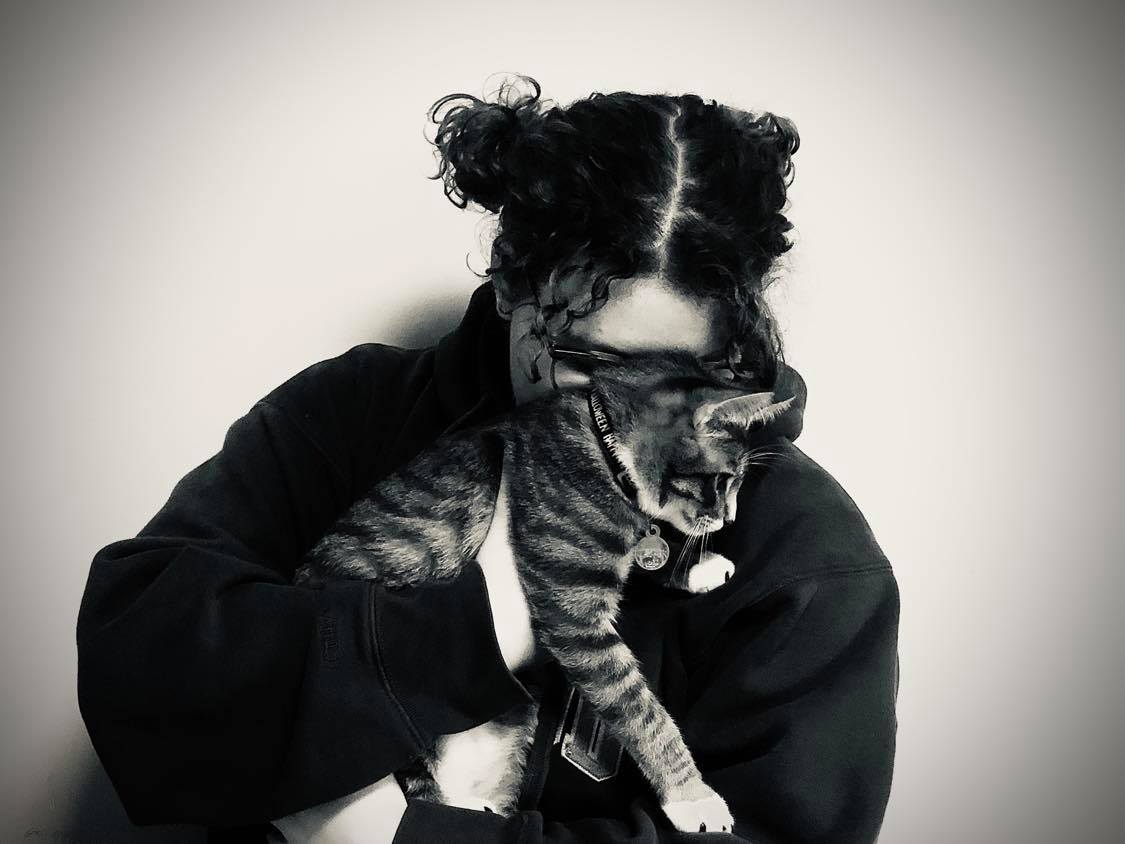By Cambrie Eckert
Wherever Abby goes, Casper follows.
Casper is Abby’s six-month-old kitten. He helps Abby, serving as her emotional support animal (ESA) on campus.
SUNY Brockport student Abigail Parnham (Abby) suffers from depression, anxiety, post-traumatic-stress-disorder (PTSD) and attention-deficit-hyperactivity-disorder (ADHD). Casper helps her to alleviate these symptoms, calming her down in stressful situations.
According to the Alvarado Parkway Institute, “Focusing on their ESA helps draw their attention away from the things that cause anxiety and help them become motivated to do things that are good for their mental health, like getting outside and going on walks. The responsibility of an animal may be a challenge, but it also gives people a sense of purpose and increased positivity.”
ESAs have been shown to improve people’s lives in well-documented cases of those suffering from mental health conditions. Associate Director at Hazen Health Center, Darlene Schmitt has worked with students who have a support animal as a part of their treatment plan.
“Emotional support animals are solely for the purpose of allowing someone with a mental health diagnosis to enjoy their residence equally as somebody without a mental health diagnosis,” Schmitt said.
Bringing an animal to a college campus is a big step, one that requires extensive documentation and a lengthy application to get approved for.
“Basically, you have to have an animal that you want to be your ESA. Then, if you’re applying to have this animal at your school you need to get a doctor’s note, an official diagnosis with a mental health issue and documentation of your animal being completely vet approved,” Parnham said.
Having an animal on campus is no easy task, though.
“I definitely have forgotten to feed him when I’m getting ready in the morning to go to classes because I am already scrambling. Sometimes though, I have days where I can barely function myself, let alone take care of something,” Parnham said.
Although it can be difficult, Parnham believes having a support animal to push you to confront these struggles is beneficial in the long run. They aren’t just some task you can put off, they depend upon you and love you unconditionally.
“They’re just a great way to bring happiness into your life when you already struggle with mental illness,” Parnham said.
For Parnham, she believes Casper’s overall benefits outweigh the occasional struggles. She says he has helped her through so much in just a few weeks on campus and she wouldn’t be able to do it without him.
Though beneficial, when one lives on a college campus this can cause problems for the student as well as others around them. Schmitt advises people to be mindful of traumatized or allergic students when applying for an ESA on campus.
Parnham suffers from anxiety attacks when around other dogs after a traumatic assault from her dog Brutus in 2020. Unfortunately for her, another student on campus has a support dog right down the hall from her room. Although it is within that student’s right to have a support animal in the dorms, it negatively impacts her.

“I struggled really hard with coming to terms with being attacked by that dog. I still have scars across my chest, my arms, my back. It was bad,” Parnham recalls. “I had a nightmare about the incident the other night and I woke up in a cold sweat, but Casper was there to help calm me down.”
Casper plays his role in helping Parnham work through her trauma so she can coexist with other support animals on campus.
In comparison to Parnham’s first semester at college, she believes having a support animal on campus has improved her life. She says she had trouble finding the motivation to get up in the morning to go to class. After having Casper with her on campus, she says he gave her a routine and her motivation back.
Although an ESA is just one animal, they can make a big impact on someone’s life, even from just a single touch.
“There is science behind the fact that petting an animal lowers heart rate and blood pressure and provides calm, soothing effects,” Schmitt said. “Animals, particularly dogs and some cats, can provide unconditional love and support of a person who maybe feels lonely or is too anxious to make friends.”
Schmitt believes having an ESA is extremely beneficial, particularly with those who suffer from anxiety or depression. By lowering a student’s heart rate and calming them, this reduces stress and anxiety. For those with depression, ESAs can become a protective aspect for them.
Support animals help protect those like Abby who need it most.



























